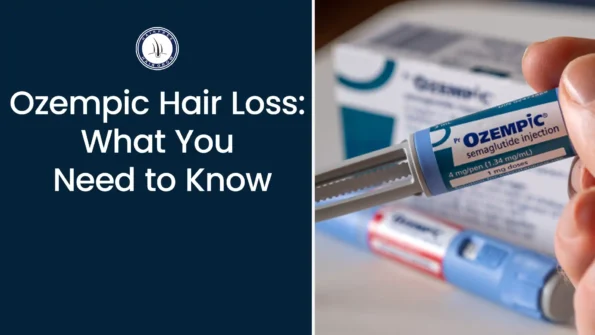You’ve probably heard all the buzz about “Ozempic face,” but why isn’t anyone talking about Ozempic hair loss? Today, we’re diving into this topic to clear things up. Let’s break it down in simple terms and figure out what’s really going on with your hair when you’re on Ozempic.
What Is Ozempic Anyway?
Ozempic (and its cousin Wegovy) are brand names for a drug called semaglutide. Doctors use it to treat diabetes and help with weight loss. It’s part of a group of meds called GLP-1 receptor agonists. How does it work? It slows down how fast food leaves your stomach and cuts your appetite. That’s why people lose weight on it—sometimes a lot of weight, and fast!
You’ve likely seen Ozempic all over social media or the news. Celebrities have even admitted to using it to slim down. But along with the weight loss, some folks notice changes like Ozempic and hair thinning. So, what’s the deal?
Does Ozempic Cause Hair Loss?
Here’s the big question: Does Ozempic cause hair loss? Well, not exactly. The hair loss isn’t directly from the drug itself. Instead, it’s tied to losing weight quickly. When you drop pounds fast—whether from Ozempic, crash diets, or surgery—your body can freak out. It sees rapid weight loss as a stressor, and that can lead to a type of hair shedding called telogen effluvium.
This isn’t unique to Ozempic. Anything stressful—like having a baby, getting sick, or even jet lag—can trigger it. So, Ozempic hair loss isn’t about the med; it’s about how your body reacts to the change.
Why Does Hair Fall Out?
Let’s keep it simple. Normally, about 10% of your hair is in a “resting” phase called telogen. But when something stressful happens—like rapid weight loss—up to 40% of your hair can shift into this phase. After 3-4 months, those resting hairs fall out as new ones start growing. That’s when you notice clumps in the shower or on your brush. Scary? Yes. Permanent? No!
Event | What Happens to Hair | Timeline |
Rapid Weight Loss | Hair shifts to resting phase | Starts 3-4 months later |
Hair Shedding Peaks | Lots of hair falls out | 6-9 months |
New Hair Grows | Baby hairs appear, thickness returns | 6-12 months |
The shedding can make your hair look thinner at first, but it usually grows back. You might even spot a fringe of new “baby hairs” on your forehead as things get back to normal.
Semaglutide Hair Loss: Is It Different?
Since Ozempic is semaglutide, you might wonder if semaglutide hair loss is somehow special. Nope! It’s the same deal—rapid weight loss is the trigger, not the drug itself. Whether you’re on Ozempic, Wegovy, or another semaglutide med, the hair shedding comes from your body adjusting, not the medication doing something funky to your scalp.
Other Stressors That Cause Hair Shedding
Telogen effluvium isn’t just about weight loss. Check out these other triggers:
- Childbirth: Hormones and stress can make hair fall out months later.
- Illness or Fever: Your body shifts focus away from hair growth.
- Surgery or Accidents: Physical stress can shake things up.
- Jet Lag or Sunburn: Even small stressors can do it!
So, if you’re losing hair on Ozempic, don’t blame the drug right away. It’s likely the weight loss speed that’s throwing your hair cycle off.
Ozempic Side Effects: Hair Loss and Beyond
Let’s talk about Ozempic side effects hair loss. While hair shedding isn’t listed as a direct side effect, rapid weight loss is a known outcome of the drug—and that’s where the connection comes in. Other side effects like nausea or stomach issues might add stress too, but the hair thing? It’s mostly about the pounds dropping fast.
Another cool fact: your nails might show signs too! Ever heard of Beau’s lines? They’re little grooves that pop up on your nails after a stressful event. If the groove’s halfway down your nail, the stress (like weight loss) probably hit about 2.5 months ago. Nails and hair react to the same stuff!
Does It Get Better?
Good news: in most cases, Ozempic hair loss isn’t permanent. Once your weight loss slows down or stops, your hair cycle usually gets back on track. It might take 6-9 months—or longer if the shedding turns chronic (which is rare). New hair will push out the old, and your thickness should return.
But here’s a twist: if you’ve got a genetic hair loss condition (like androgenetic alopecia), the shedding might make it more noticeable. This is super common in people with PCOS, who often deal with both obesity and hormonal hair thinning.
Who’s at Risk?
Some folks might see more hair loss than others. Here’s who might need to watch out:
- People with PCOS: Hormonal imbalances can already cause hair thinning, and rapid weight loss adds to it.
- Fast Losers: The quicker you drop weight, the more likely the shedding.
- Poor Nutrition: If you’re low on nutrients like protein, zinc, or B vitamins to start with, hair can suffer more.
If you’re on Ozempic without a doctor’s supervision, you might be at higher risk too. High doses or skipping check-ins can lead to bigger side effects—including worse shedding.
How to Minimize Ozempic and Hair Thinning
Worried about Ozempic and hair thinning? You can’t totally stop telogen effluvium, but you can make it less intense. Here’s how:
- Work with Your Doctor: They’ll keep your dose safe and weight loss steady—not crazy fast.
- Eat Right: Protein, zinc, iron, and B vitamins are your hair’s best friends. A dietitian can help if you’re eating less on Ozempic.
- Check Nutrients: People with obesity might already lack stuff like biotin or vitamin D. Fix that before it gets worse.
Supplements like Hair, Skin, and Nails vitamins? Talk to your doctor first. Biotin can mess with blood tests (like thyroid ones), so it’s not always a quick fix.
What About Treatments?
- Minoxidil: This hair growth med might speed things up, but it can cause shedding at first. Worth it? Maybe not for temporary telogen effluvium.
- Spironolactone: Great for androgenetic alopecia (not shedding), especially if you’ve got PCOS.
- Laser Therapy: Low-level lasers might help, but they’re pricey. Do the math on cost vs. benefit.
For most people, waiting it out works fine since the hair grows back naturally.
Final Thoughts
So, Ozempic hair loss isn’t really about the drug—it’s about rapid weight loss stressing your body. It’s distressing to see hair fall out, but it’s usually temporary. Stick with your healthcare team, keep your nutrition solid, and your hair should bounce back. And hey, if someone tries to shame you for taking Ozempic, remind them: that even jet lag can cause this! It’s not about the med; it’s about how your body rolls with change.

Written By
Dr. Pankaj Khunt
MD – Ukraine
Dr. Pankaj Khunt is a hair restoration expert specializing in Ozempic Hair Loss. He provides insights into its causes, prevention, and treatment, helping patients maintain healthy hair while managing their health. His expert guidance ensures effective solutions for hair concerns.
Disclaimer
We’ve made all possible efforts to ensure that the information provided here is accurate, up-to-date and complete, however, it should not be treated as a substitute for professional medical advice, diagnosis or treatment. See Detailed Disclaimers Here.


